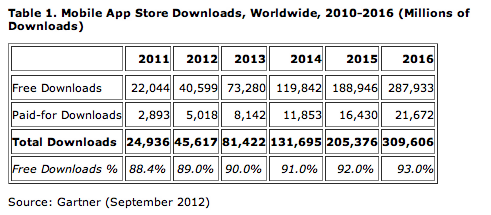These are the times, when every third person that you meet in Technology world has an idea for an App. It could be every alternate person if you’re hanging out in geeky groups or among heavy Smartphone users.
The Industry trends suggest a phenomenal surge as well. According to Gartner, Mobile Apps Store downloads worldwide for the year 2012 will surpass 45.6 billion. Out of these, nearly 90% are free Apps, while out of the rest of 5 billion downloads majority (90% again) cost less than $3 per download. This trend has a strong growth curve for the next five years. (See Table 1. Mobile App Store Downloads, courtesy: Gartner)
Another report suggests that 78% of US mobile App Companies are small businesses (based on the Apple and Android App Stores based research). The typical apps that dominate this market are games, education, productivity, and business.
This comes as no surprise. There is a huge divide between the Enterprise Mobility (dominated by the Enterprise Architecture, existing platforms and mobility extensions to the platforms that ensure business continuity) and End-User (Consumer) Mobile Apps dominated by the App Stores supported Small and Mid-size App Development Companies. The barriers to entry in the Smart phone Apps Market seem pretty low with the supporting ecosystem from Apple, Amazon, Google, and Telecom carriers.
However, let’s get back to the fact that majority of these Apps “do not” generate direct revenue.
While the entry seems without barriers, there are multiple hurdles on the race track:
1. Developers need to focus on the User Experience. The smartphone apps pick-up is highly skewed toward Apps that offer a good user experience even for minimal functionality. After the initial success, the App makers end up adding functionality for sustained interest, but the User Experience tops. It’s difficult to focus on UX while still trying to do everything right at the underlying architecture level for long term.
2. Marketing is important. Getting the early eyeballs is key for the App developers. Any serious App needs an immediate initial take-off, and among the things that they need to do to make it happen is to market the App beforehand and to get the authoritative reviews in place.
3. Initial Take-off is just the first hurdle. App needs to be able to handle traffic bursts, it needs scale with increased traction, support virality & social connects inherently, and also build an effective User ecosystem. None of these may seem like the core functional features of the App, but are most critical for the broad-based success.
4. The Freemium model is very popular, but it can kill the business if the marginal costs are not sustainable. The paradox of the Free model is that unless the 10% paid users are able to pay for your 100% costs, every additional user takes you closer to the grave. With this come in two questions – how do you keep the infrastructural costs low, and how do you build additional revenue models around the app.
- IaaS can solve some of the infrastructural headache, but doesn’t provide you with the other functional layers that every App needs. You need to still build them. PaaS providers provide the scalable platform for building Apps, but you still need to build some of the functional features such as Gaming Rooms support, Messaging, User Authentication & authorization models, and so on. Mobile developers are still doing a lot of repetitive work across the smartphone Apps that can be consolidated into a framework.
- Supporting the additional revenue models require integration with external Ad-services, Payment systems and more importantly the bandwidth to deal with this even more fragmented set of agencies.
5. The End-point device platforms are fragmented and getting even more so. A typical model for App developers is to develop an Android App, iOS App or a Windows App and then support the other platforms as they go along. However, keeping up with these multiple platforms is only getting more and more difficult with the speed with which Apple, Microsoft, and Google keep rolling out the OS. There’s tremendous pressure to release the App within the 1-3 days window of the release of the underlying platform.
Hence, while there are millions of people developing smartphone Apps as we speak, there are only a fraction that get built at serious level, and even smaller fraction that gets built for sustainable business success.
And considering these hurdles, the arrival of the Backend-as-a-Service (BaaS) is a blessing for the App Developers. Forrster’s Michael Facemire refers to them as “The New Lightweight Middleware”. He goes ahead and lists out some of the basic tenets of what makes a Mobile Backend as a Service, but I see this list evolving as the vendors offer more and more functionality to the customers leading to en ecosystem.
And the term “ecosystem” is going to be the key. That’s because a successful mobile App doesn’t stop at the user starting the app, using the app, and leaving the app. A successful App creates an ecosystem for the viral growth, user engagement, social functionality, in-built broad-based connectivity for multi-user interactions, and more importantly the ability for cross-platform usage. In a Gaming scenario, the user interactions and the relevant immediate feedbacks are paramount. Most successful apps build an ecosystem. Instagram, 4Square, Pinterest are the common household examples today.
 While Michael lists out the usual suspects in his post, most of them in the Silicon Valley, there is a very interesting player in Shephertz’s App42 platform, right here in India. The ecosystem approach that they have taken seems pretty much what may be required for serious app developers that need a robust backend provided as a service, so that they can focus on the app functionality, user experience, and more importantly the marketing aspects of the App.
While Michael lists out the usual suspects in his post, most of them in the Silicon Valley, there is a very interesting player in Shephertz’s App42 platform, right here in India. The ecosystem approach that they have taken seems pretty much what may be required for serious app developers that need a robust backend provided as a service, so that they can focus on the app functionality, user experience, and more importantly the marketing aspects of the App.
Now why, still, aren’t more and more developers building even more serious mobile App products? Why shouldn’t they be? I think, they will!



